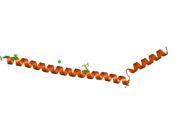Biology:SELS (gene)
 Generic protein structure example |
Selenoprotein S, also known as SELS, is a human gene.[1]
This gene encodes a selenoprotein, which contains a selenocysteine (Sec) residue at its active site. The selenocysteine is encoded by the UGA codon that normally signals translation termination. The 3' UTR of selenoprotein genes have a common stem-loop structure, the sec insertion sequence (SECIS), that is necessary for the recognition of UGA as a Sec codon rather than as a stop signal. Studies suggest that this protein may regulate cytokine production, and thus play a key role in the control of the inflammatory response. Two alternatively spliced transcript variants encoding the same protein have been found for this gene.[1]
Interactions
SELS (gene) has been shown to interact with Valosin-containing protein.[2][3]
References
- ↑ 1.0 1.1 "Entrez Gene: SELS selenoprotein S". https://www.ncbi.nlm.nih.gov/sites/entrez?Db=gene&Cmd=ShowDetailView&TermToSearch=55829.
- ↑ Ye, Yihong; Shibata Yoko; Yun Chi; Ron David; Rapoport Tom A (Jun 2004). "A membrane protein complex mediates retro-translocation from the ER lumen into the cytosol". Nature 429 (6994): 841–847. doi:10.1038/nature02656. PMID 15215856. Bibcode: 2004Natur.429..841Y.
- ↑ Wang, Qiuyan; Li Lianyun; Ye Yihong (Mar 2008). "Inhibition of p97-dependent Protein Degradation by Eeyarestatin I". J. Biol. Chem. 283 (12): 7445–7454. doi:10.1074/jbc.M708347200. ISSN 0021-9258. PMID 18199748.
Further reading
- "Isolation of novel and known genes from a human fetal cochlear cDNA library using subtractive hybridization and differential screening". Genomics 23 (1): 42–50. 1995. doi:10.1006/geno.1994.1457. PMID 7829101.
- Maruyama K; Sugano S (1994). "Oligo-capping: a simple method to replace the cap structure of eukaryotic mRNAs with oligoribonucleotides". Gene 138 (1–2): 171–174. doi:10.1016/0378-1119(94)90802-8. PMID 8125298.
- Bonaldo MF; Lennon G; Soares MB (1997). "Normalization and subtraction: two approaches to facilitate gene discovery". Genome Res. 6 (9): 791–806. doi:10.1101/gr.6.9.791. PMID 8889548.
- "Construction and characterization of a full length-enriched and a 5'-end-enriched cDNA library". Gene 200 (1–2): 149–156. 1997. doi:10.1016/S0378-1119(97)00411-3. PMID 9373149.
- "Gene expression profiling in the human hypothalamus-pituitary-adrenal axis and full-length cDNA cloning". Proc. Natl. Acad. Sci. U.S.A. 97 (17): 9543–9548. 2000. doi:10.1073/pnas.160270997. PMID 10931946. Bibcode: 2000PNAS...97.9543H.
- "Tanis: a link between type 2 diabetes and inflammation?". Diabetes 51 (6): 1859–1866. 2002. doi:10.2337/diabetes.51.6.1859. PMID 12031974.
- "Generation and initial analysis of more than 15,000 full-length human and mouse cDNA sequences". Proc. Natl. Acad. Sci. U.S.A. 99 (26): 16899–16903. 2003. doi:10.1073/pnas.242603899. PMID 12477932. Bibcode: 2002PNAS...9916899M.
- "Elevation in Tanis expression alters glucose metabolism and insulin sensitivity in H4IIE cells". Diabetes 52 (4): 929–934. 2003. doi:10.2337/diabetes.52.4.929. PMID 12663463.
- "Characterization of mammalian selenoproteomes". Science 300 (5624): 1439–1443. 2003. doi:10.1126/science.1083516. PMID 12775843. Bibcode: 2003Sci...300.1439K. http://digitalcommons.unl.edu/cgi/viewcontent.cgi?article=1072&context=biochemgladyshev.
- "Complete sequencing and characterization of 21,243 full-length human cDNAs". Nat. Genet. 36 (1): 40–45. 2004. doi:10.1038/ng1285. PMID 14702039.
- "Regulation of the selenoprotein SelS by glucose deprivation and endoplasmic reticulum stress - SelS is a novel glucose-regulated protein". FEBS Lett. 563 (1–3): 185–190. 2004. doi:10.1016/S0014-5793(04)00296-0. PMID 15063746.
- "Relationship between serum amyloid A level and Tanis/SelS mRNA expression in skeletal muscle and adipose tissue from healthy and type 2 diabetic subjects". Diabetes 53 (6): 1424–1428. 2004. doi:10.2337/diabetes.53.6.1424. PMID 15161744.
- "A membrane protein complex mediates retro-translocation from the ER lumen into the cytosol". Nature 429 (6994): 841–847. 2004. doi:10.1038/nature02656. PMID 15215856. Bibcode: 2004Natur.429..841Y.
- "The Status, Quality, and Expansion of the NIH Full-Length cDNA Project: The Mammalian Gene Collection (MGC)". Genome Res. 14 (10B): 2121–2127. 2004. doi:10.1101/gr.2596504. PMID 15489334.
- Lilley BN; Ploegh HL (2006). "Multiprotein complexes that link dislocation, ubiquitination, and extraction of misfolded proteins from the endoplasmic reticulum membrane". Proc. Natl. Acad. Sci. U.S.A. 102 (40): 14296–14301. doi:10.1073/pnas.0505014102. PMID 16186509.
- "Recruitment of the p97 ATPase and ubiquitin ligases to the site of retrotranslocation at the endoplasmic reticulum membrane". Proc. Natl. Acad. Sci. U.S.A. 102 (40): 14132–14138. 2006. doi:10.1073/pnas.0505006102. PMID 16186510.
- "Genetic variation in selenoprotein S influences inflammatory response". Nat. Genet. 37 (11): 1234–1241. 2006. doi:10.1038/ng1655. PMID 16227999.
- "Activation of the selenoprotein SEPS1 gene expression by pro-inflammatory cytokines in HepG2 cells". Cytokine 33 (5): 246–251. 2006. doi:10.1016/j.cyto.2006.02.005. PMID 16574427.
- "Secretion of the glucose-regulated selenoprotein SEPS1 from hepatoma cells". Biochem. Biophys. Res. Commun. 356 (3): 636–641. 2007. doi:10.1016/j.bbrc.2007.03.018. PMID 17374524.
- "The role of the selenoprotein S (SELS) gene -105G>A promoter polymorphism in inflammatory bowel disease and regulation of SELS gene expression in intestinal inflammation". Tissue Antigens 70 (3): 238–246. 2007. doi:10.1111/j.1399-0039.2007.00888.x. PMID 17661913.
 |


